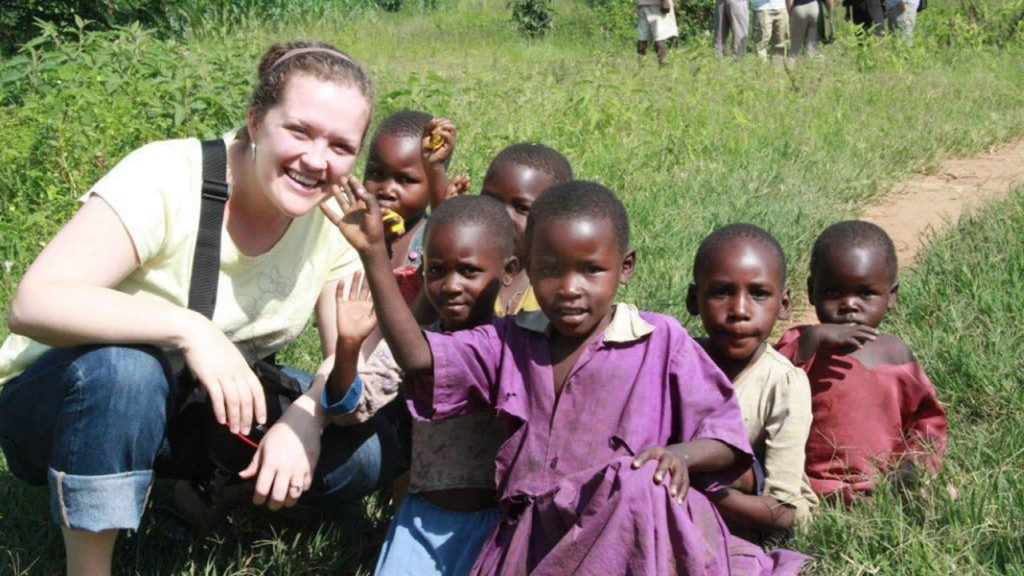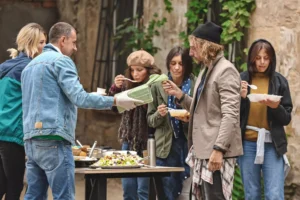It’s been five months.
Five months since wheels down in Uganda. Since taking the unpaved-road-less-traveled with a side of sporadic infrastructure. Since “goodbye everybody, jambo Africa.”
But from the moment my family wheeled/lugged/toddled/wandered in a jet-lagged fog across the tarmac, missions looked pretty different from the ol’ slideshow in the church basement.
For one, our family definitely opted for a house vs. hut. Yes, there is a lot of red dust here, and cockroaches I wish were still safely behind Plexiglas at the zoo. There was that vervet monkey the size of my 4 year old hopping through our driveway. But we live in a city. We own a microwave. And I have been known to tear open the occasional packet of ramen noodles.
Does God still work in mighty ways? Unquestionably, like everywhere we’ve lived.
Is it an adventure? Yes. But not where you necessarily want adventure: Weird rashes. Near-accidents in clotted, nerve-wracking traffic. Questionable plumbing. Come to think of it, we had some questionable plumbing issues in the States, too. Could be the same four kids flushing too much toilet paper.
Is it a PowerPoint presentation waiting to happen? Rarely. Overall, overseas missions has a lot less of an ethereal glow … and a lot more perspiration. But it’s also much like everyday life — just more uncomfortable and farther away from a lot of people we love. So here are a few memos from a rookie.
Missions isn’t fast. Short-term trips can leave an exhilarating impression of missions “highs.” But discipleship has more in common with cultivating a fruit tree than it does microwaving a taquito.
“Go and make disciples” — life-on-life, from the inside-out disciples — takes time whether you’re in Little Rock or Kampala. Lots of it. Some of the greatest impact and most profound change unfold one leaf at a time, nourished and pruned through all weather. Behind every family- and world-changing Christian is someone who’s simply, authentically modeled how to walk like Jesus in matters minor and major.
Here at the five-month mark, our relationships are still saplings. A lot of our cultivating involves meeting needs where people feel “holes” in their lives, which are where the Gospel best flows through.This is a concept voiced by Steve Douglass, President of Cru (Campus Crusade for Christ). It’s supporting someone with where we buy produce, engaging the vendor at a bodega in conversation, or sharing a meal. It’s Bible study on the back porch, living out godly family life for locals observing us 24/7, or for my husband, surveying a plot of land for ministries that serve the poor. It’s lengthy, seemingly unproductive interactions when we might rather be checking off our to-do lists efficiently.
But we want to empower nationals to reach their own people rather than making them dependent. So this means a long haul of walking with people through the mundane, through failure and hopefully, celebrating small triumphs.
Missions isn’t simple. As a missionary friend ruminated, “The longer I’m here, the more complex ‘helping’ becomes.” Both physical and spiritual poverty can be deeply systemic — from decades of choices by people far beyond the individual. We’re talking roots in history, culture, education, justice, government, healthcare, personal perception, and spirituality, to name a handful. Excellent booksFor a truly valuable resource on helping the impoverished, I would recommend When Helping Hurts: Alleviating Poverty Without Hurting the Poor…and Yourself, by Steve Corbett, Brian Fikkert, and David Platt (Moody, 2012). warn us against “McMissions”: one-size-fits all “solutions” neglecting cultural context and other patterns that have engulfed people since birth — and ultimately, help no one.
Reaching those caught in or affected by these patterns can be downright discouraging. Our national friend was considering ending her pregnancy; she didn’t think she and her husband could provide for another child. Their dreams of entrepreneurship have so many hurdles; school fees to compensate for public education are so high, and as her husband lamented, “A child here is only born into suffering.” We had them over for dinner, talked about business planning and gently encouraged them spiritually. Our conversations continue over Saturdays and phone calls, wrestling through reality.
Thomas Merton writes,
Do not depend on hope of results. When…doing…essentially an apostolic work, you may have to face the fact that your work will be apparently worthless and even achieve no results at all, if not perhaps results opposite … The big results are not in your hands or mine.… All the good that you will do will not come from you but from the fact that you have allowed yourself, in the obedience of faith, to be used by God’s love.Thomas Merton, a Trappist monk of the Abbey of Gethsemani, Ky., was a poet, social activist and student of comparative religion. This quote was from his “Letter to a Young Activist.”
Missions is as much about learning as giving or teaching. Here where so much is unjust, inconvenient or underdeveloped, I have to constantly guard my mind from cultural or spiritual superiority. I have to realize all over again God’s grace toward me.
I must constantly be a student who learns and embraces this place, rooting for it, understanding it and loving its people (see Jeremiah 29:4-14). We’re learning the local tribal language despite widespread English. It bridges cultural gaps and demonstrates that we have something to learn, whether from a taxi driver or a cashier. We can’t be just more white people marching in with a superior plan of benevolent rescuing, whether in Uganda or the inner city U.S.
That urgent need for humility means how I do things here is as important as what I’m doing (see 1 Corinthians 13:3). “Count others more significant than yourselves” (Philippians 2:3, ESV) certainly applies to anyone I’m hoping to reach or teach.
As much as God’s gifted the North American church with great abundance to share, the African church has its own distinctive assets and representation of His image. Its long-term suffering and leanness of material resources, for example, bring unique perspectives on faith, perseverance and continued openhandedness. My dear national friend Olivia, an AIDS orphan who then adopted a pair of abandoned twins, knows generosity and God’s faithful provision in ways far beyond me. And Monica, essentially given into an abusive arranged marriage at 13 so that her family could pay the bills with her dowry, bubbles over with genuine kindness and God-sized faith. “Discipleship” goes both ways.
Missions is about God far more than about my own personal need to make a difference. I’ve pictured myself as a missionary since I was a kid. I wanted to make a difference for God: to do something “big,” show Him my level of commitment, have a life that impacted the world for Christ. (Key operative concepts: I/my.)
When God initially called me somewhere other than overseas, I wondered if I was a sellout. What was I doing in suburbia, smack in the middle of Normalville, U.S.A., doing what everybody else was doing? The line from You’ve Got Mail ricocheted in my brain: I lead a small life — well, valuable, but small — and sometimes I wonder, do I do it because I like it, [i.e. God has called me here] or because I haven’t been brave?
God showed me key lessons — particularly, “Bloom where you’re planted, suburbia included.” He isn’t going to hold me accountable for something He hasn’t asked, but for faithfulness wherever He puts me.
He also began to reveal that a life well-lived is not a “big” or unique life, with vast quantities of people impacted. Often those desires have me at their true center. Instead, “in Christ Jesus…The only thing that counts is faith expressing itself through love” (Galatians 5:6, NIV). That’s whether loving on a next-door neighbor and her kids in the U.S., or somewhere with cockroaches the size of a smart car.
In C.S. Lewis’ The Great Divorce, characters encounter “one of the great ones” in heaven. Though on earth the narrator had never heard of this quiet British resident, he witnesses the now “unbearable beauty of her face.” How did she come to be so significant?
Her accomplishment, Lewis illustrates, is that she loved well — as if each person she met was her own child. It’s that kind of love that changes the world over and over again.
Missions isn’t as neatly packaged as I’d like. Substantial energy levels are required just for everyday living in a foreign culture. Combined with deep-seated, heart-wrenching problems just outside my gate, the prospect of helping seems hugely daunting — and at times, just above futile. I’m still finding that place between “making the most of every opportunity” and “swiftly entering burnout.” Missions is painfully slow. It is complex. And my own consistent need for a Savior is revealed over and over as my sin and weakness emerge in startling ways.
Quite simply, the Great Commission is God-sized. It takes a daily, intimate experience of God’s sovereignty to anchor me. Walking down the street, every dilapidated shack with a child out front, every burqua with a soul wrapped inside, every evidence that heaven is still to come, extends an opportunity for faith, hope and resurrection that is far greater than any problem. I find hope in the bookends of that same Commission: “All authority in heaven and on earth has been given to Me. Go, therefore…And behold, I am with you always, to the end of the age” (Matthew 28:18-19, 20, ESV).
Copyright 2012 Janel Breitenstein. All rights reserved.










